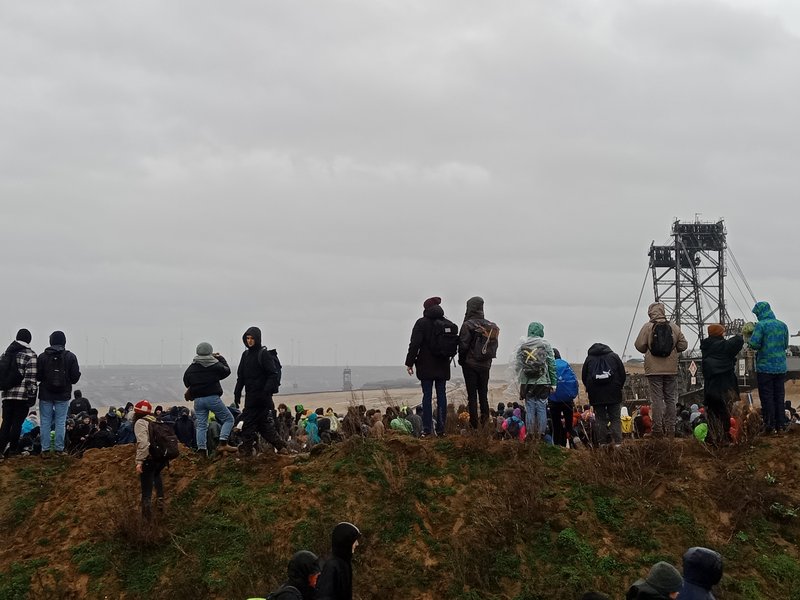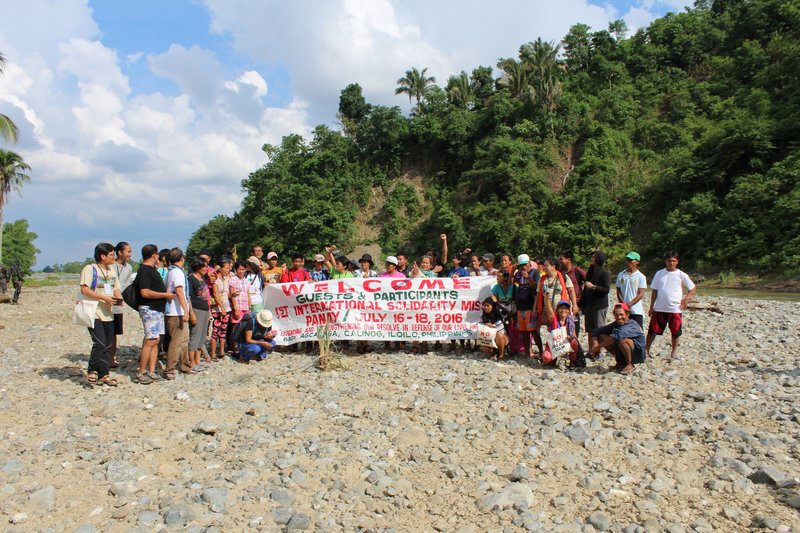On Saturday, the philippinenbüro joined the rally against the demolition of Lützerath, a village at the edge of the brown coalfield in North Rhine-Westphalia. About 35,000 people called for an end to coal mining and demanded climate justice. The Swedish climate activist Greta Thunberg spoke at the rally at the edge of the open pit mine Garzweiler. She called on the protesters to continue the fight: “The carbon is still in the ground. We are still here. Lützerath is still there. And as long as the carbon is still in the ground, this struggle is not over. We have no plan to give up.”
1,5 Celsius means: Keep it in the ground
In October 2022, the German government and the energy giant RWE decided to end coal-based energy by 2030, eight years earlier than the previously agreed exit in 2038. Until then RWE can continue to extract 280 million tons of coal from its mine in Garzweiler. Five villages shall no longer be demolished but Lützerath shall loose its ground. The German government and RWE argue that the coal under Lützerath is needed to ensure Germany’s energy supply. Environmental groups and the German Institute for Economic Research (DIW) however question the necessity to demolish Lützerath and warn of the effects of the expanded extraction. “Lützerath must and should not be destroyed if Germany adheres to its climate goals and energy transition as planned”, says Claudia Kemfert of the DIW. For two years activists have occupied the village and struggle against the expansion of the coal mines but have now been forcefully removed.

Protesters in front of the RWE open pit Garzweiler (© Hannah Wolf).
Philippines among the most affected countries
While Germany is one of the biggest CO2 emitters in the world, the Philippines belong to those countries, most vulnerable to the effects of climate change and to increasing extreme climate events. Climate change causes heavy destruction of people’s lives, properties, and livelihoods. Every year, at least 20 typhoons hit the Philippines and wreak havoc to the country and its people. Strong and continues rains in the past two months have led to heavy and widespread floods in different parts of the Philippines. At least 31 people died and 10 went missing. Thousands had to evacuate, people lost their houses and livelihoods, classes were repeatedly suspended, infrastructure was damaged, and especially farmers and fishers experienced substantial losses.
Environmental Defenders under attack
Those who assist the affected communities and those who fight for climate justice in the Philippines are being labeled as terrorists, threatened, criminalized and even killed. In 2021, Global Witness named the Philippines the deadliest country for land and environmental defenders in Asia. Killings are often linked to the opposition to mining, logging, and dam projects. One sad example is the Tumandok massacre in December 2020: nine indigenous Tumandok leaders were massacred by joint state forces and at least 15 others were arrested. The Tumandok leaders had peacefully opposed a mega dam project that threatens to flood their land and destroy their communities.

International Solidarity Mission with the Tumandok in 2016 in Tapaz and Calinog, Panay. The militar patrolled at the sidelines where people where protesting the Jalaur mega dam. (© philippinenbüro).
Global struggle for climate justice
Philippine Climate activist Mitzi Jonelle Tan says: “We are all very connected and the profit-oriented system that we are in, wants us to think that we are so separate and different from each other. White, Person of Color, Black, this country, this continent. But in the end, really, […] we have to connect, if we want to change something.”
On Saturday, many activists from around the globe demonstrated this interconnectedness in a broad and united call to stop the demolition of Lützerath.
In the global struggle for climate justice, the exit from fossil fuels is urgently needed to enable life for current and future generations in Germany, in the Philippines and elsewhere on this globe. As one of the biggest polluters Germany has an enormous responsibility to stick to the 1,5 Celsius goal and to keep the coal under Lützerath in the ground.









